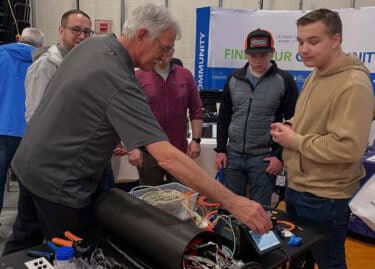For Immediate Release
April 29, 2020
Community College System of NH Outlines Relief Priorities
NH Community Colleges Hope to Use Federal Stimulus Funds
to Help Students Stay in College, Re-Build and Re-Align NH Workforce
Concord, NH – Speaking today to the Governor’s Office for Emergency Relief and Recovery, Community College System of NH officials will highlight the need to keep students in college and working toward completion of a degree or certificate, particularly in technical programs that require on-site lab instruction. Charles Ansell, Chief Operating Officer for CCSNH, will outline areas of immediate need that focus on lab-based instruction and social distancing. A second proposal from CCSNH is aimed at relieving the state’s high unemployment rate and reducing the draw on unemployment benefits, by supporting individuals enrolling in programs in high-impact economic sectors in New Hampshire.
The first area of immediate need outlined by CCSNH is funding to support lab-based instruction and social distancing for on-campus courses for students poised to compete a program this year. “While CCSNH very effectively transitioned to remote instruction, certain lab and hands-on course components still need to be delivered in person,” said Ansell. “As restrictions begin to lift we will need to bring students back into labs safely so they can complete their programs.” Ansell said this need is critical for students who are completing degrees and certificates in the technical trades, such as line worker programs, automotive and HVAC, as well as healthcare programs, among others where lab hours are required for licensing or to qualify for career-entry exams.
Outfitting classrooms and labs for new forms of more socially distanced on-campus learning will include making provisions for extended lab times and instruction, setting up additional lecture capture technology, and other new elements of remote engagement. “With small class sizes even in normal times, CCSNH anticipates being well able, with some social distancing modifications, to continue to deliver outstanding education,” said Ansell.
Looking ahead, CCSNH offered a “FastForward” program to bring relief to the state’s economy, help newly unemployed individuals, and offer local and affordable ways for students to begin college, as travelling out of state for college may be less appealing or feasible for NH students. This program would include providing tuition support for students and making focused career advising broadly available to students coming out of high school and those suffering job loss. The approach CCSNH outlined is designed to help the state meet occupational needs to address the public health crisis, work with the recently unemployed to retrain for high-demand areas, and meet students in their time of high financial need in more constructive ways than through unemployment insurance alone. CCSNH would focus on high-impact economic sectors that remain strong or will rebound once restrictions lift, such as information technology, healthcare, technical trades, business occupations and manufacturing.
“Unemployment insurance helps meet immediate needs, but doesn’t help people build more secure and stable economic lives,” said Ansell. “This is the time for New Hampshire to focus on upskilling our workforce, and for individuals this is the time to prepare for jobs that will be more lucrative and stable post-pandemic. If we are smart about those efforts now, New Hampshire will be well-positioned once our economy shifts back into growth mode.”



